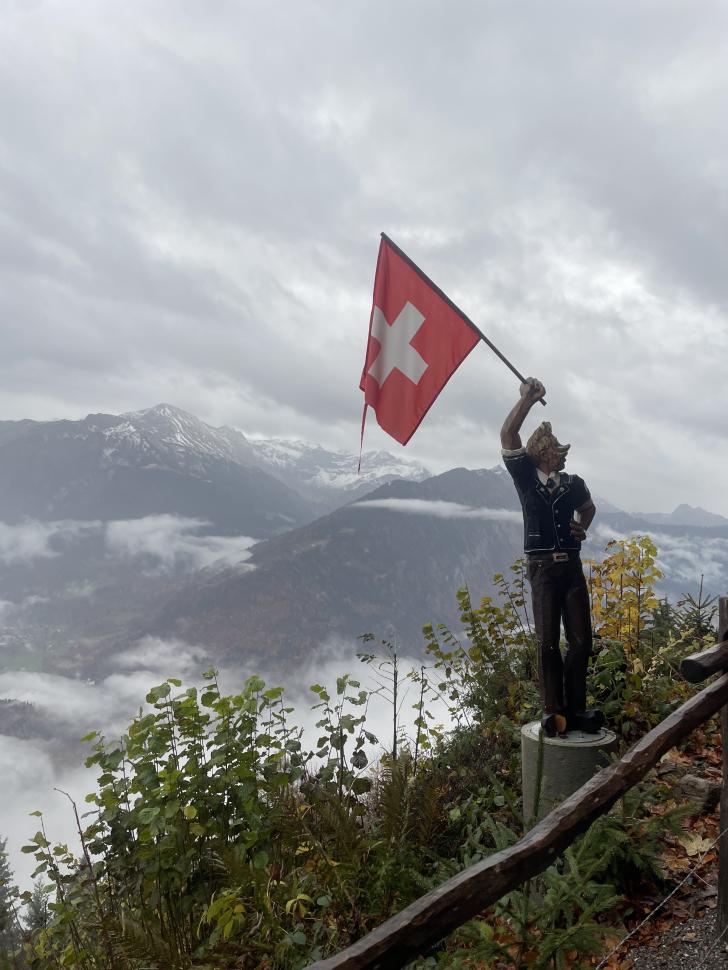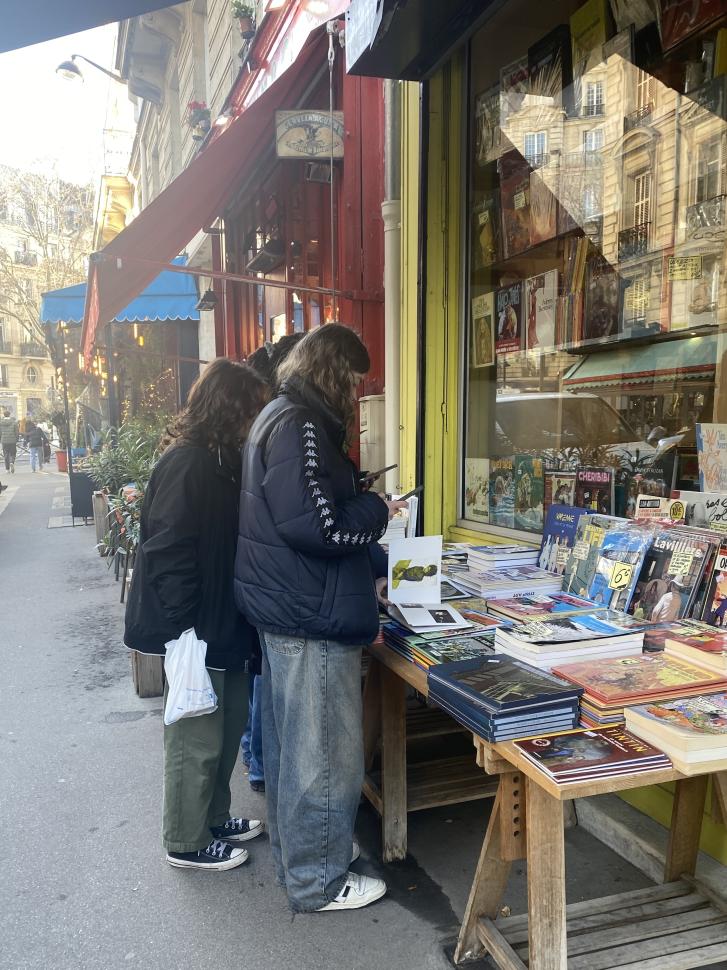Are you a UBC undergrad thinking about going on a student exchange? It can be a daunting decision. You might wonder, what's it like spending a year or a semester in another country? How can you prepare? And how do you handle it when things go sideways? We talked with a group of UBC Global Ambassadors who studied abroad with a Go Global program. They spoke with us candidly, sharing their personal impressions, fears and misgivings, best memories, top tips and advice. (This story is part of a series of Global Exchange Insider interviews.)
Meet Nicole Tam, a 4th-year UBC undergrad in the Integrated Science program in the Faculty of Science. She grew up in Vancouver, BC.
Before you go
Why did you pick University of Edinburgh for a semester abroad? How did you hear about it?
As someone who was born and raised in Vancouver, as soon as I chose to attend UBC for my undergraduate degree, I also knew that I wanted to go on exchange. For me, going on exchange was never an option; it was something that I had always thought was essential to my undergraduate experience. I chose Edinburgh in particular because of its rich cultural history and also I wanted to study in the UK.

Hiking up “The Stor” on a trip to the Isle of Skye in the Scottish Highlands (photo: Nicole Tam)
What was the application process like? Any tips?
The Go Global application is relatively straightforward. I think the trickiest part is choosing the three partner schools that you are interested in. I wanted to complete some of my degree requirements while I was away; so while choosing a school, I looked at the Transfer Credit Portal to see which partner universities had classes I was interested in taking with predetermined transfer credits. This really helped me inform my decision of which partner university to choose.
How did you prepare? Anything to be aware of? (travel, cultural differences, classes, etc.)
Accommodation is university-specific, but the University of Edinburgh offers residence accommodation to all of their incoming exchange students. Through the university portal, I was able to look at the different accommodation options and choose my top five (you don’t get to rank them, though). I was assigned a residence and room a few days later, which was great. A couple things to note about accommodation is to pick carefully: the university tries to match you with a residence that you requested, but they will only match you once. I had three days to accept their accommodation offer, and if I either declined or didn’t answer, my residence offer would have been revoked and I would have had to find accommodation on my own. In addition, most of the accommodations are suite-styled and self-catered, which differs from many residences in Canada.
One really helpful thing that the UK offers are student kits called UniKitOut: you can preorder everything you would need to furnish your dorm and kitchen. It gets delivered to your dorm, is relatively inexpensive and super convenient. I would highly recommend it!
Before I left Vancouver, I also checked in with AMS StudentCare and went through the medical coverage that I had access to. I also emailed StudentCare and was able to request a formal letter showing proof of coverage for the duration and location of my exchange. There are health insurance travel passports you can print off from the student care website, and I kept a copy of that in my wallet as well. I ended up not needing to access any medical coverage or care during my exchange, but a few of my friends did so this is something I would strongly encourage looking at before you leave.
In addition to sorting out my accommodation and health insurance, I also checked the UK government website to see if there were any other documents that I might need to enter the country and check-in with the University of Edinburgh. Based on what I read, I ended up bringing several documents with me in case they asked for them at customs, including bank statements, proof of enrollment (for UBC and Edinburgh), my exchange acceptance letter, my accommodation confirmation and all of my insurance documents.
What worries did you have beforehand? How did you overcome the anxiety?
Even though I always knew I wanted to go on exchange, I still did have a few things I was apprehensive about before I left. Moving to a new country has its challenges and there are lots of things to sort out before leaving, such as accommodation, finances and travel-health insurance. For me personally, the best way to alleviate my worries was to tackle each issue through preparation and research so I didn’t have to be worried about logistics once I arrived.
Exploring Central London on a weekend trip (photo: Nicole Zef)
During the experience
How was the overall experience? What did you learn?
Great! I did miss my family and friends back home. But ultimately, I wouldn’t have traded my time in the UK for anything, and I’m quite certain that the hardest part of my entire exchange was leaving. I really enjoyed learning more about culture, through both living in a different country and travelling. In addition, I met so many unique people who have such different life experiences than I do, I think that really opened my eyes.
Walking around Nyhavn in Copenhagen, Denmark (photo: Nicole Zef)
“(My flatmates) came with me to the airport and walked me all the way to security until they weren’t allowed to go any further. It was a perfect end to a wonderful four months spent in the UK, with the people who had somehow become my home.”
If you could change something or do it differently, what would you change or do?
I think I would have been more active in the university community. I was only on exchange for four months, and so most of the time I had went towards making new friends, attending classes and travelling. Looking back, I do wish that I had joined more clubs or attended more university events. I also never went to watch a live football (soccer) game, which is something I regret immensely.
How were the academics?
I was warned before leaving that the academics in Europe are much more self-directed than in Canada. At UBC, students are used to having classes several times a week, and there are many assignments and midterms throughout the term. I took two science classes and an art course at the University of Edinburgh (three courses is a full course load there!) and found all of them to be much less intensive—although still difficult—than the classes I was used to. There is a greater emphasis on essay writing and, in general, there are fewer assignments. But they are worth a much larger percentage of your grade. For example, one of my classes had a 40 percent essay and a 60 percent final, while another had a 70 percent final, a 20 percent essay and a 10 percent midterm. There is also less class time and an expectation that you are able to keep on top of new material yourself, since there are no assignments to keep you accountable. This was really great for travelling. All of the lectures were recorded when I was there, but it did mean that I had to be careful to stay on top of my school work because I didn’t want to be overwhelmed during finals season.
How was the social aspect?
One of the main reasons I chose to go on exchange in Europe was so that I’d have the opportunity to travel. I was lucky enough to only have classes from Monday to Thursday, which meant that from Friday to Sunday I could travel to other cities and places. I joined an exchange student club which organized tours and ended up going on a three-day tour of the Scottish Highlands at the end of September, which was great.
A lot of exchange students, especially those from North America, want to travel, and so it’s easy to find people to travel with. During my time in Edinburgh, I also visited London, Glasgow, Manchester, Amsterdam, Copenhagen, Switzerland and Paris. These weekend trips were wonderful, but they were also exhausting. My friends and I exclusively flew on budget airlines (RyanAir and EasyJet), so I also got really good at only packing a backpack for the weekend. A lot of exchange students spend the majority of their time travelling. And while I did travel a fair bit, I also loved exploring the city of Edinburgh.
While I was in Edinburgh, I made friends in my classes and joined the cocktail club, which was really fun. I also became close with my flatmates, who are all full-time students at the University of Edinburgh and helped me settle into life in the UK. They introduced me to different British sweets, attempted to teach me how to speak with a British accent and we would also go to the pub to watch football. Mostly, we would hang out in our flat chatting or making “family dinners,” which sounds mundane, but honestly might be the thing I miss the most.

Foggy view from Harder Kulm in Interlaken, Switzerland (photo: Nicole Tam)
After the experience
Would you recommend this experience to others? What can they look forward to?
I would absolutely recommend going on exchange to other students. I can’t imagine my undergraduate experience without it, and can’t fathom having never met the friends I made while away. I don’t think it really matters where you go—everyone’s exchange experience is different. But you get out of it what you put into it, and living in a new place, travelling and meeting new people from all around the world could be life-changing for you; it certainly was for me.
I have so many favourite memories from my exchange. But if I had to pick one, it might be my final few days in Edinburgh before I returned to Canada. I was the last of my flatmates to finish exams, and they stayed in the city so we could have an extended farewell. After my last exam finished, we actually flew to Paris for 36 hours as a goodbye trip. It was so special to be there with them. I had been travelling all term, but we hadn’t actually been anywhere together yet. We did the touristy things: such as visiting museums and climbing the Eiffel Tower. Paris in December is gorgeous. But I mostly just remember being so happy to have met them.
By the time we flew back to Edinburgh, I had one day left to pack up my room and my life in Edinburgh. That last day was a whirlwind: we exchanged Christmas presents and watched a British Christmas Classical called “Nativity!” We popped Christmas crackers and made pancakes for dinner together, which was a tradition we had started at the beginning of the term. They came with me to the airport and walked me all the way to security until they weren’t allowed to go any further. It was a perfect end to a wonderful four months spent in the UK, with the people who had somehow become my home.
A pretty sunset and street view from my flat in Edinburgh, Scotland (photo: Nicole Tam/Sancia Hamilton)
What was the impact on your academic and personal development?
Attending university at a different school has really shown me the different ways that learning—academic or not—can happen. I feel like I learned so much about myself during my time away, especially since I had never been so far away from my friends and family. In terms of academic development, I took a few very interesting courses that really solidified my interest in my degree. I am also now considering applying to postgraduate degrees abroad.
In terms of personal development, I think my time away taught me a lot of life lessons. In some ways, it solidified my personal values and was a good exercise in both restraint and learning to leave my comfort zone. I realized so clearly that over anything else, I valued the people I had met and the connections I made. I’m not sure if I’ll ever be able to sufficiently explain (or even know) the way my experience abroad has changed me, but I do know that it is something that was the experience of a lifetime—and something I am very grateful I had the opportunity to do.

My flatmates and I exploring a bookshop in the streets of Paris (photo: Nicole Tam)
Read more Go Global student stories.